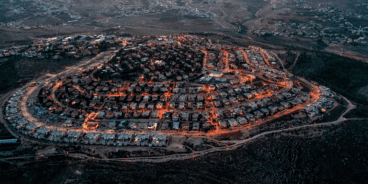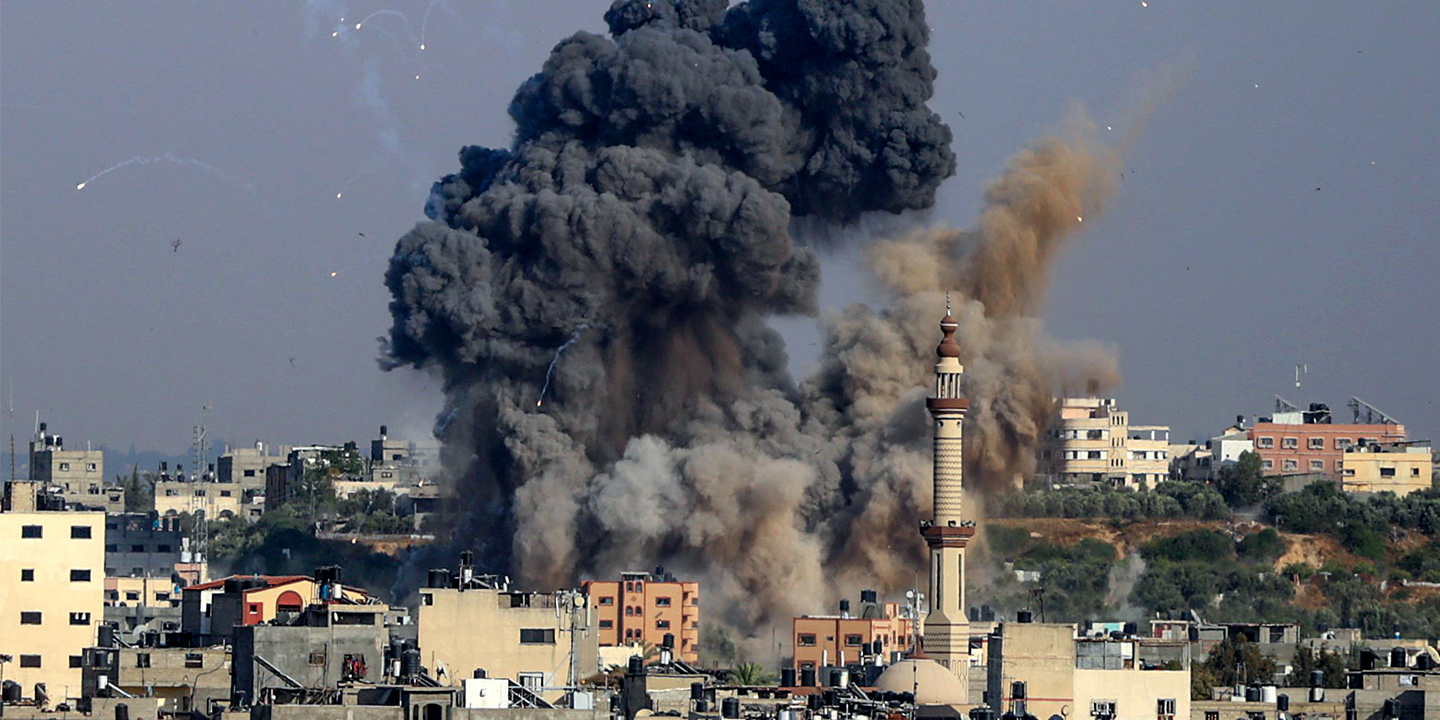

Atrocity Alert No. 252: Israel and the Occupied Palestinian Territories, Burkina Faso and Ethiopia
Atrocity Alert is a weekly publication by the Global Centre for the Responsibility to Protect highlighting situations where populations are at risk of, or are enduring, mass atrocity crimes.
CIVILIANS KILLED AS THREAT OF WAR GROWS BETWEEN ISRAEL AND HAMAS
Airstrikes on Gaza and rocket attacks on Israel have continued for a third day as the escalating conflict between Israel and the Palestinian militant group Hamas approaches a full scale war. Since Monday more than 1,500 rockets have been fired into Israel, the majority of which have been intercepted. Israel has carried out hundreds of airstrikes on Gaza, including demolishing a 13-story residential building. As of Wednesday, six people, including a soldier and a child, have been killed by rocket attacks on Israel while at least 56 Palestinians, including 14 children, have been killed by Israeli bombing.
The latest violence follows weeks of escalating tensions in Occupied East Jerusalem. Since early April, Palestinians have protested against the possible forced eviction of eight refugee families residing in Sheikh Jarrah following a legal challenge by a Jewish settler organization, Nahalat Shimon. Israeli police officers have used excessive force, attacking and arresting protesters. On 9 May Israel’s Supreme Court postponed a hearing on the evictions.
Israel has controlled East Jerusalem since the 1967 war, but Article 49 of the Fourth Geneva Convention prohibits an occupying power from transferring parts of its civilian population into occupied territory. Jahaan Pittalwala, Research Analyst at the Global Centre for the Responsibility to Protect, said that, “forced evictions of Palestinian families from East Jerusalem are rooted in the Israeli government’s apartheid policies. The illegal transfer of Israeli settlers into occupied territory may amount to a war crime.”
With tensions already high in Jerusalem, last Friday, 7 May, Israeli security forces stormed the Al-Aqsa Mosque compound as tens of thousands of worshippers finished their prayers during the Muslim holy month of Ramadan. Israeli authorities fired rubber bullets and stun grenades at Palestinian protesters who were throwing rocks. The situation escalated further on Monday when Israeli forces carried out another raid on the Al-Aqsa Mosque, one of the holiest sites in Islam. According to the UN Office for the Coordination of Humanitarian Affairs, more than 1,000 Palestinians were wounded between 7-10 May. At least 17 Israeli police were also injured.
On 11 May two UN Special Rapporteurs issued a joint statement asserting that, “the recent scenes of Israeli police and security forces attacking large crowds of Palestinian residents and worshipers is only intensifying a deeply inflammatory atmosphere in the City. A militarized response to civilian protests against discriminatory practices only deepens social divisions.”
In response to the violence at the Al-Aqsa Mosque, Hamas and other Palestinian militant groups began firing rockets into Israel and Israel responded with airstrikes targeting Gaza. The international community, including the UN Secretary General, has reacted with alarm to the growing violence while the UN Security Council has held two emergency sessions to discuss the crisis.
Recurring armed conflict between Israel and the Hamas de facto administration in Gaza has resulted in collective punishment of Palestinians in the occupied territories and unlawful attacks on civilians by both the Israel Defense Forces (IDF) and Palestinian armed groups. There has been no accountability for potential war crimes committed during the 2014 Gaza war between Hamas and Israel, nor for the disproportionate and deadly use of force by the IDF in response to protests along the Gaza border during 2018-2019. There is a need for urgent international diplomatic intervention in order to deescalate tensions and prevent the outbreak of yet another war between Hamas and Israel in which civilians will pay the greatest price.
THOUSANDS FLEE DEADLY ATTACKS BY ARMED GROUPS IN BURKINA FASO
Between 26 April and 3 May, at least 51 people were killed and more than 17,500 forced to flee due to a spate of attacks by armed groups across eastern and northern Burkina Faso. The death toll includes 30 civilians who were killed on 3 May in Kodyel, Komandjari province, when unidentified armed men surrounded the village, burned down homes and shot villagers as they tried to escape. The perpetrators also looted health centers and shops. The gunmen allegedly targeted the village because it provided fighters for the country’s civilian volunteer program, which provides arms and training to help combat Islamist armed groups.
A week before the Kodyel attack, 18 villagers were also killed in Yattakou in the country’s Sahel region. That same day, two Spanish journalists and an Irish conservationist were also killed and a Burkinabè soldier remains missing after their convoy was ambushed.
The recent attacks are symptomatic of the insecurity spreading across the Central Sahel – Burkina Faso, Mali and Niger – endangering the lives and livelihoods of millions of people. Civilians face potential atrocity crimes as a result of attacks by Islamist armed groups and state security forces, as well as conflict between ethnic militias and community “self-defense groups.”
Since mid-2018, Islamist armed groups have regularly attacked civilians and civilian infrastructure in Burkina Faso, including schools, health centers and places of worship. These groups also summarily execute people they believe support the Burkinabè government.
As a result, Burkina Faso is now home to one of the world’s fastest growing humanitarian crises, with more than 1.14 million people forcibly displaced in just over two years. Over 3.5 million people are in need of humanitarian assistance and 1.5 million people are in need of protection. The international community should provide emergency assistance to the Burkinabè government to help relieve the humanitarian crisis and strengthen its capacity to protect civilians from further atrocities.
WAR CRIMES AGAINST RELIGIOUS LEADERS AND CULTURAL HERITAGE IN ETHIOPIA
On 7 May a video statement by the head of Ethiopia’s Orthodox Tewahedo Church, Abune Mathias, was posted to social media, detailing attacks on religious sites in the Tigray region as well as other atrocities, including the rape of women and girls. Noting the “many barbarisms” being committed across Ethiopia, the Patriarch emphasized that “what is happening in Tigray is of the highest brutality and cruelty.”
Abune Mathias, who is ethnically Tigrayan, also indicated that he has been prevented from speaking out against atrocities committed in the Tigray region. The video was reportedly filmed by a foreign NGO worker on his mobile phone and smuggled out of Ethiopia. On 11 May the General Secretary of the Holy Synod distanced the Church from the Patriarch’s remarks, stating that they were issued in his personal capacity and not as an official statement.
Throughout the six-month armed conflict in Tigray, possible crimes against humanity and war crimes have been committed against civilians, including attacks on religious and cultural heritage sites. In late November at least 800 people were massacred around the UNESCO World Heritage site of Aksum, including civilians sheltering in St. Mary of Zion church. Civilians were also massacred at Maryam Dengelat church by Eritrean forces who opened fire on congregants. Numerous ancient religious sites of international cultural significance have also been looted and bombed, including the al-Nejashi mosque and the Debre Damo monastery.
Religious leaders have also been targeted. A letter to the Holy Synod of the Church that was shared with the UK newspaper, The Telegraph, listed 78 priests, deacons, choristers and monks who have allegedly been killed by Ethiopian National Defense Forces (ENDF) and their Eritrean allies. One massacre took place at the church of Adi’Zeban Karagiorgis on 9 January during a holy festival, with the ENDF allegedly executing 12 deacons who were between the ages of 15 and 20. On 29 April the Associated Press also reported that priests are among the thousands of ethnic Tigrayans being arbitrarily detained in Ethiopia, “sometimes with ethnic profiling as the sole reason.”
The deliberate destruction of protected cultural heritage is a war crime under international law. All attacks on cultural sites, religious leaders and other civilians in Ethiopia must be independently investigated and the perpetrators held accountable, regardless of rank or affiliation.
Related Content


Atrocity Alert No. 403: Israel and the Occupied Palestinian Territory, Sudan and the UN Human Rights Council
